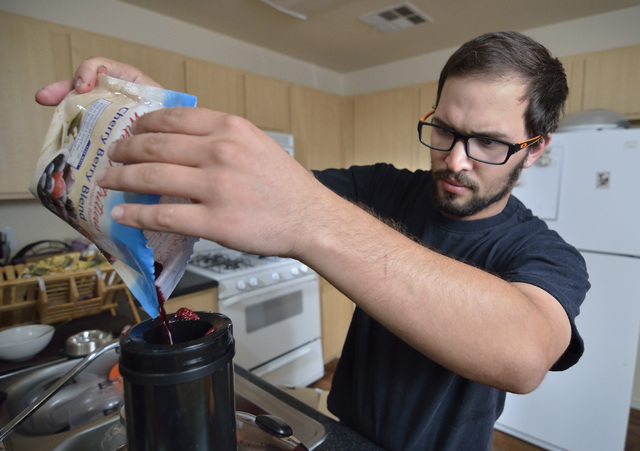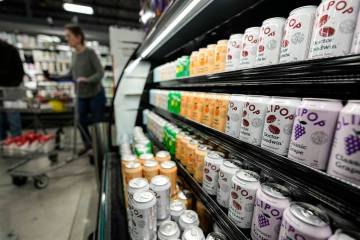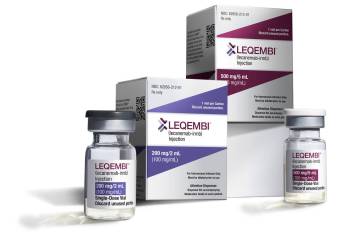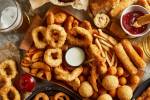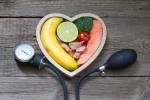American lifestyle sets stage for irritable bowel syndrome
About two years ago, John Brownie started getting stomach cramps every time he ate something. He always felt bloated and was frequently constipated. At the height of his discomfort, he hadn’t had a bowel movement in two weeks.
“One day I got to the point where everything I ate I threw up, and my girlfriend had to take me to the emergency room,” Brownie, 23, said. “The emergency room doc diagnosed me as having irritable bowel syndrome.”
Irritable bowel syndrome, commonly called IBS, is a gastrointestinal disorder of the GI tract that primarily affects the large intestine. IBS’ causes are not exactly known, but researchers feel it is triggered by certain foods such as chocolate, milk, carbonated beverages, alcohol, caffeine, spicy or fatty foods, and foods causing gas that include cabbage, cauliflower, beans and broccoli.
People with IBS find that stress also worsens the condition, and women going through hormonal changes are twice as likely to have IBS, researchers have found. According to the National Institute of Diabetes and Digestive and Kidney Diseases, IBS affects 3 percent to 20 percent of adults, but only 5 percent to 7 percent of the adult population has been diagnosed with the condition.
IBS tends to affect people younger than 45, and twice as many women as men have the condition. People who have had a family member with IBS tend to be more at risk, studies show.
Because IBS is considered a chronic condition needing to be addressed lifelong, symptoms can be managed through diet, lifestyle changes and stress management.
Now that he finally knows what’s causing discomfort, Brownie has been changing his diet and lifestyle to combat his illness. No more processed foods, dairy products or alcohol. He bulks up on fiber supplements such as Metamucil, makes his own hamburgers and drinks lactose-free almond milk.
“I wake up in the morning and make a smoothie with strawberries and cantaloupe,” Brownie said. “The only thing that bugs me are people eating pizza because I can’t have it. The other problem is if I’m on the road and trying to find a place that is healthy to eat.”
Also, Brownie tends to eat less by saving half his dinner and eating it for lunch the next day. He satisfies his hunger throughout the day by eating protein bars and brown rice.
“Rice cakes are my friend, now,” Brownie said with a laugh. “For dinner what works is buying fresh bags of vegetables and any type of protein such as beef, chicken or pork.
“It’s a learning curve. You have to experiment and learn what you can and can’t have. I don’t drink any beer or eat processed wheat. Hamburgers without cheese are healthy.”
Dr. Roger Hsiung, a board certified colorectal surgeon with the Colon and Rectal Clinic of Las Vegas, said IBS usually doesn’t occur unless a person has had a bad diet for several years. This would include eating a lot of fast-food meals, sodas, processed foods and anything containing high-fructose corn syrup.
“IBS is common in the United States because of Americans’ high-caloric diets and eating high-gas foods,” Hsiung said. “Once you eliminate these from your diet you will get better. But you need to cut out these foods for a long time.”
Hsiung said you can’t do a simple blood test to determine whether a person has IBS. A physician needs to follow a clinical approach of what he calls a “diagnosis of exclusion.”
“You rule out colon cancer first and then gluten allergies,” Hsiung said. “One common denominator is that after a bowel movement you feel relieved of pain. … This has to happen with regularity — at least three times a week. Either constipation or diarrhea predominates.”
Hsiung said once someone identifies and eliminates foods that are causing IBS and replaces them with high-fiber foods, his condition will start to improve. It’s also important not to lead a sedentary lifestyle, he added.
Though IBS isn’t life-threatening in itself, Hsiung said having the condition does put a person at risk of developing intestinal polyps, which have been known to lead to cancer if not treated early.
Besides dietary lifestyle changes and fiber supplements, medications can also be prescribed if your doctor feels they are necessary. As stated by the National Institute of Diabetes and Digestive and Kidney Diseases, Lubiprostone (Amitiza) improves abdominal pain or discomfort, constipation and stool consistency. Linaclotide (Linzess) relives abdominal pain and increases the frequency of bowel movements. Hyoscyamine (Levsin) and dicyclomine (Bentyl) can relieve painful bowel spasms.
Because stress can stimulate colon spasms in people who have IBS, learning relaxation techniques can be helpful, researchers recommend, as can following regular exercise routines, getting enough sleep, eliminating stressful situations and seeking professional counseling for stress management if recommended by your physician.
“If a person is motivated and attacks the IBS from all angles that includes diet, proper medications and lifestyle motivations, you may see a change in four to six weeks,” Hsiung said. “IBS will always be a problem unless Americans learn to eat healthier.”
Brownie’s advice practically mirrors Hsiung’s:
“If you are experiencing what I had, you better go see a doctor because it can be deadly,” Brownie said. “If I had waited, I could have harmed my system bad and may have had to have surgery.”
FOR MORE INFORMATION
For further details about IBS and other GI disorders contact:
• American Neurogastroenterology and Motility Society, 45685 Harmony Lane, Belleville, MI 48111. Phone: 734-699-1130. Website: www.motilitysociety.org.
• International Foundation for Functional Gastrointestinal Disorders, 700 W. Virginia St., Suite 201, Milwaukee, WI 53204. Phone: 1-888-964-2001 or 414-964-1799. Website: www.iffgd.org.
• Rome Foundation Inc., P.O. Box 6524, Raleigh, NC 27628. Phone: 919-539-3051. Website: www.romecriteria.org.
FAST FACTS
• IBS is a functional gastrointestinal (GI) disorder, meaning symptoms are caused by changes in how the GI tract works.
• IBS is a group of symptoms that occur together, not a disease.
• The most common symptoms of IBS are abdominal pain or discomfort and changes in bowel habits. Symptoms may include diarrhea, constipation, feeling that a bowel movement is incomplete, passing mucus and abdominal bloating.
• The causes of IBS are not well understood. Researchers believe a combination of physical and mental health issues can lead to IBS.
• To diagnose IBS, a health care provider will conduct a physical exam and take a complete medical history that will include symptoms, family history of GI disorders, recent infections, medications and stressful events related to the onset of symptoms.
• Though IBS does not have a cure, the symptoms can be treated with a combination of: changes in eating, diet and nutrition; medications; probiotics and therapies for mental health problems.
Source: National Institute of Diabetes and Digestive and Kidney Diseases



